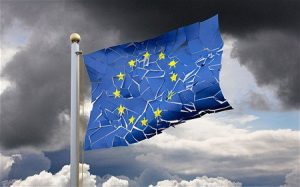 Ημερήσια διάταξή τους μπορεί να είναι πάνω στα βράχια στις Ηνωμένες Πολιτείες αυτή τη στιγμή , αλλά αυτό δεν σημαίνει ότι οι παγκοσμιοποίησης να σταματήσει. Στην πραγματικότητα, μια σημαντική ώθηση προς μια κοινωνία χωρίς μετρητά γίνεται στην Ευρωπαϊκή Ένωση αυτή τη στιγμή. Τον περασμένο Μάιο μάθαμε ότι το 500 σημείωμα του ευρώείναι να εξαλειφθεί εντελώς ,και μόλις πριν από λίγες εβδομάδες, η Ευρωπαϊκή Επιτροπή έδωσε στη δημοσιότητα ένα νέο« Σχέδιο Δράσης » , η οποία δίνει εντολή στα κράτη μέλη να διερευνήσουν «δυναμικό ανώτατα όρια για τις πληρωμές τοις μετρητοίς”. Στο όνομα της «καταπολέμησης της τρομοκρατίας», αυτό το “σχέδιο δράσης” συζητά τα οφέλη της “απαγορεύσεις για τις πληρωμές σε μετρητά που υπερβαίνουν ένα συγκεκριμένο όριο» και λέει ότι οι απαγορεύσεις θα πρέπει να περιλαμβάνει «εικονικά νομίσματα (όπως BitCoin) και προπληρωμένα μέσα (όπως προπληρωμένες πιστωτικές κάρτες), όταν χρησιμοποιούνται ανώνυμα. ”
Ημερήσια διάταξή τους μπορεί να είναι πάνω στα βράχια στις Ηνωμένες Πολιτείες αυτή τη στιγμή , αλλά αυτό δεν σημαίνει ότι οι παγκοσμιοποίησης να σταματήσει. Στην πραγματικότητα, μια σημαντική ώθηση προς μια κοινωνία χωρίς μετρητά γίνεται στην Ευρωπαϊκή Ένωση αυτή τη στιγμή. Τον περασμένο Μάιο μάθαμε ότι το 500 σημείωμα του ευρώείναι να εξαλειφθεί εντελώς ,και μόλις πριν από λίγες εβδομάδες, η Ευρωπαϊκή Επιτροπή έδωσε στη δημοσιότητα ένα νέο« Σχέδιο Δράσης » , η οποία δίνει εντολή στα κράτη μέλη να διερευνήσουν «δυναμικό ανώτατα όρια για τις πληρωμές τοις μετρητοίς”. Στο όνομα της «καταπολέμησης της τρομοκρατίας», αυτό το “σχέδιο δράσης” συζητά τα οφέλη της “απαγορεύσεις για τις πληρωμές σε μετρητά που υπερβαίνουν ένα συγκεκριμένο όριο» και λέει ότι οι απαγορεύσεις θα πρέπει να περιλαμβάνει «εικονικά νομίσματα (όπως BitCoin) και προπληρωμένα μέσα (όπως προπληρωμένες πιστωτικές κάρτες), όταν χρησιμοποιούνται ανώνυμα. ”
Το νέο αυτό έγγραφο δεν αναφέρει τι είναι το κατάλληλο όριο θα είναι για τα κράτη μέλη, αλλά ξέρουμε ότι η Ισπανία έχει ήδη απαγορεύσει ορισμένες συναλλαγές σε μετρητά άνω των 2.500 ευρώ, ενώ η Ιταλία και η Γαλλία να απαγορεύσει ήδη συναλλαγές σε μετρητά άνω των 1.000 ευρώ.
Αυτός είναι ένας τέλειος τρόπος για τη μετάβαση σε μια κοινωνία χωρίς μετρητά χωρίς να δημιουργήσει πάρα πολύ από μια αναστάτωση. Θέτοντας ένα μέγιστο νόμιμο όριο για τις συναλλαγές μετρητών και σιγά-σιγά τη μείωση αυτή, το αποτέλεσμα που μπορεί σιγά-σιγά αλλά σταθερά μετρητά φάση χωρίς τους ανθρώπους την κατανόηση του τι συμβαίνει.
Και υπάρχουν πολλά μέρη στην Ευρώπη, όπου είναι πολύ δύσκολο να χρησιμοποιήσει ακόμη και τα μετρητά σε αυτό το σημείο. Στη Σουηδία , πολλές τράπεζες δεν είναι πλέον λάβει ή να δώσει μετρητά, και περίπου το 95 τοις εκατό όλων των συναλλαγών λιανικής πώλησης είναι εξ ολοκλήρου χωρίς τη χρήση μετρητών. Έτσι, ακόμη κι αν η Σουηδία δεν έχει απαγορεύσει επίσημα μετρητά, χρησιμοποιώντας μετρητά δεν είναι πλέον πρακτική στις περισσότερες περιπτώσεις. Στην πραγματικότητα, πολλοί τουρίστες είναι συγκλονισμένος για να ανακαλύψει ότι δεν μπορούν να πληρώσουν ακόμη και
λεωφορείο με μετρητά.
Έτσι, το μεγαλύτερο μέρος της Ευρώπης είναι ήδη κινείται προς αυτή την κατεύθυνση, και τώρα αυτό το νέο σχέδιο δράσης έχει ως στόχο να επιταχύνουν τη μετάβαση σε μια κοινωνία χωρίς μετρητά. Το κοινό λένε ότι έχουν ληφθεί αυτά τα μέτρα για την καταπολέμηση του ξεπλύματος χρήματος και της τρομοκρατίας, αλλά φυσικά αυτό είναι μόνο ένα μικρό μέρος της αλήθειας. Το παρακάτω προέρχεται από το Anti-Media …
Το ευρωπαϊκό σχέδιο δράσης δεν αναφέρει ένα συγκεκριμένο ποσό σε δολάρια για την επιβολή περιορισμών, αλλά όπως ήταν αναμενόμενο, το σκεπτικό τους για την κίνηση είναι να ματαιώσει το ξέπλυμα χρήματος και τη χρηματοδότηση της τρομοκρατίας.Συνοριακών ελέγχων μεταξύ των χωρών έχουν ήδη ενισχυθεί για να βοηθήσει την εφαρμογή αυτών των νέων προτύπων στο σκληρό περιουσιακών στοιχείων. Αν και αυτά τα τέλη στόχοι είναι εύλογες, υπάρχουν και άλλες σαφείς κίνητρα στις κυβερνήσεις να στοχεύσουν χαρτονόμισμα που δεν είναι τόσο ευγενής.
Σε μια πραγματικά χωρίς μετρητά κοινωνία, οι κυβερνήσεις θα είναι σε θέση να παρακολουθείτε όπου όλοι είναι και αυτό που ο καθένας κάνει όλη την ώρα. Και για να έχουν πρόσβαση στο σύστημα χωρίς μετρητά, οι άνθρωποι θα πρέπει να συμμορφώνονται με ό, τι απαιτήσεις κυβερνήσεις ήθελαν να επιβάλουν στους αβοήθητους τους πληθυσμούς τους. Το δυναμικό για την τυραννία που αυτό θα δημιουργήσει θα είναι από τα διαγράμματα, αλλά πολύ λίγοι άνθρωποι φαίνεται να ανησυχεί σε μεγάλο βαθμό από τη μετάβαση προς ένα σύστημα χωρίς τη χρήση μετρητών σε όλο τον κόσμο.
Ακόμη και στις Ηνωμένες Πολιτείες υπάρχουν εκκλήσεις για ένα σύστημα χωρίς μετρητά. Για παράδειγμα, ο πρώην επικεφαλής οικονομολόγος του ΔΝΤ, έγραψε ένα άρθρο για την εφημερίδα Wall Street Journal, όχι πολύ καιρό πρινστην οποία εισηγήθηκε την κατάργηση του $ 100 νομοσχέδιο …
Υπάρχει μικρή συζήτηση μεταξύ των υπηρεσιών επιβολής του νόμου ότι το νόμισμα χαρτί, ιδιαίτερα μεγάλα σημειώσεις όπως οι ΗΠΑ $ 100 νομοσχέδιο, διευκολύνει το έγκλημα: εκβιασμός, εκβιασμούς, ξέπλυμα χρήματος, τα ναρκωτικά και η εμπορία ανθρώπων, η διαφθορά των δημοσίων υπαλλήλων, για να μην αναφέρουμε την τρομοκρατία. Υπάρχουν υποκατάστατα για τα μετρητά-cryptocurrencies, άκοπα διαμάντια, χρυσά νομίσματα, προπληρωμένες κάρτες, αλλά και για πολλά είδη των ποινικών πράξεων, τα μετρητά είναι ακόμα βασιλιάς. Παρέχει απόλυτη ανωνυμία, η φορητότητα, η ρευστότητα και η σχεδόν καθολική αποδοχή. “
Πάνω σε περιορισμούς της Ασίας οι οποίες τίθενται σε μετρητά καθώς και. Ο θρυλικός επενδυτής Jim Rogers, σχολίασε σχετικά με το τι συμβαίνει αυτή τη στιγμή στην Ινδία κατά τη διάρκεια μιας πρόσφατης το podcast …
Ο χρόνος θα έρθει όταν δεν θα είστε σε θέση να αγοράσει ένα φλιτζάνι καφέ χωρίς να εντοπιστεί, προειδοποιεί γκουρού των επενδύσεων Jim Rogers. Να ελέγχει τους ανθρώπους, οι κυβερνήσεις θα επιδιώξει όλο και περισσότερο για να κυνηγήσουν κάτω από τις δαπάνες σε μετρητά, προσθέτει.
«Οι κυβερνήσεις είναι πάντα ψάχνει για τον εαυτό τους πρώτα, και είναι το ίδιο παλιό πράγμα που έχει αρχίσει εδώ και εκατοντάδες χρόνια. Οι Ινδοί έκαναν πρόσφατα το ίδιο πράγμα. Απέσυραν το 86 τοις εκατό του νομίσματος σε κυκλοφορία, και έχουν πλέον καταστήσει παράνομο να δαπανήσουν περισσότερα από ό, τι, νομίζω ότι είναι περίπου $ 4.000 σε κάθε συναλλαγή σε μετρητά. Στη Γαλλία δεν μπορείτε να χρησιμοποιήσετε περισσότερο από ό, τι, νομίζω ότι είναι ένα € 1,000, “είπε ο Rogers σε μια συνέντευξη με MacroVoices Podcast.
Οι παγκοσμιοποίησης τελικά σχεδιάζουν να εξαλείψει εντελώς τα μετρητά, και αυτό θα τους δώσει ένα πρωτοφανές επίπεδο ελέγχου πάνω από την ανθρωπότητα.
Ένα πράγμα που μπορεί κάποια μέρα να εφαρμοστούν πολλές φόβος είναι κάποια μορφή συστήματος αναγνώρισης μικροτσίπ. Για να αποκτήσετε πρόσβαση στο δίκτυο χωρίς μετρητά, θα πρέπει “τσιπ ID» σας, έτσι ώστε το σύστημα θα μπορούσε θετικά την αναγνώρισή σας, αλλά φυσικά υπάρχουν εκατομμύρια άνθρωποι σε όλο τον κόσμο που δεν έχουν την πρόθεση να πάρει πελεκημένη κάτω από οποιεσδήποτε συνθήκες.
Στα παλιά τα χρόνια, θα πρέπει να επισημανθεί μια «θεωρητικός συνωμοσίας” μόνο για γεγονός που υποδηλώνει ότι μπορεί να προσπαθήσει να τσιπ όλους μας μια μέρα, αλλά το 2017 τα πράγματα έχουν αλλάξει εντελώς.
Κοιτάξτε τι συμβαίνει στη Νεβάδα. Ένα νομοσχέδιο έχει εισαχθεί στην γερουσία της πολιτείας που θα θέσει εκτός νόμου το «αναγκαστική μικροτσίπ του λαού” …
Μέλος γερουσιαστής Becky Harris είπεένα νομοσχέδιο για την απαγόρευση αναγκαστική μικροτσίπ των ανθρώπων δεν είναι τόσο τραβηγμένη όσο φαίνεται, επειδή συμβαίνει σε ορισμένα μέρη του κόσμου.
Γερουσία Μπιλ 109 θα το κακούργημα κατηγορίας Γ να απαιτήσει κάποιος να εμφυτευθεί με ένα αναγνωριστικό ραδιοσυχνοτήτων, όπως τα μικροτσίπ τοποθετείται σε κατοικίδια ζώα κάνουν.
Η ιδέα για το νομοσχέδιο ήρθε από ένα συστατικό, είπε ο Λας Βέγκας Ρεπουμπλικάνων.
Αν αυτό ακούγεται πολύ παράξενο σε σας, τότε ίσως να μην γνωρίζουν ότι οι εταιρείες σε όλο τον κόσμο έχουν ήδη αρχίσει να εξερευνήσετε αυτό το είδος της τεχνολογίας.Για παράδειγμα, μια εταιρεία στο Βέλγιο που ονομάζεται NewFusion έχει πράγματι αρχίσει να μικροτσίπ .τους υπαλλήλους τους .
Σε μια κίνηση που θα μπορούσε να αρθεί κατ ‘ευθείαν από την επιστημονική φαντασία, οι εργαζόμενοι σε μια βελγική εταιρεία εμπορίας που προσφέρονται την ευκαιρία να έχουν μικροτσίπ εμφυτεύεται στο σώμα τους.
Οι μάρκες που περιέχουν προσωπικές πληροφορίες και να παρέχουν πρόσβαση στα συστήματα πληροφορικής της εταιρείας και την έδρα, αντικαθιστώντας τις υπάρχουσες ταυτότητες.
Οι αμφιλεγόμενες συσκευές εγείρουν ερωτήματα σχετικά με την προσωπική ασφάλεια και την ασφάλεια, καθώς και αν μπορεί να επιτρέψει τις κινήσεις των ανθρώπων με τα εμφυτεύματα πρέπει να παρακολουθούνται.
Τεχνολογίας, όπως αυτό συχνά ξεκινά ως «εθελοντική», αλλά στη συνέχεια, αφού αρκετοί άνθρωποι την αποδέχονται πρόθυμα τη μετάβαση στην “υποχρεωτική” δεν είναι πάρα πολύ δύσκολο.
Ζούμε σε μια από τις πιο κρίσιμες στιγμές.σε όλη την ανθρώπινη ιστορία , και οι παγκοσμιοποίησης είναι βέβαιο ότι δεν πρόκειται να καθοριστούν και να πεθάνουν μόνο και μόνο επειδή ο Donald Trump κέρδισε τις εκλογές.
Οι ΗΠΑ αντιπροσωπεύει λιγότερο από το πέντε τοις εκατό του πληθυσμού του πλανήτη, και στο μεγαλύτερο μέρος του κόσμου η ημερήσια διάταξη των παγκοσμιοποίησης είναι σε καλό δρόμο και προχωρεί με ταχείς ρυθμούς.
Οι παγκοσμιοποίησης θέλουν μια ενοποιημένη μία παγκόσμια οικονομία, ένα ενοποιημένο μία παγκόσμια θρησκεία και μια ενοποιημένη μία παγκόσμια κυβέρνηση. Η εκλογή του Donald Trump ήταν ένα πλήγμα για τις παγκοσμιοποίησης, αλλά έχει επίσης και τους έκανε πιο επικίνδυνο, πιο αδίστακτη και πιο αποφασισμένοι από ποτέ.
Και σε περίπτωση που πιστεύετε ότι η χρήση του όρου «παγκοσμιοποίησης» είναι λίγο παράξενο, η αλήθεια είναι ότι ακόμα και οι New York Times το χρησιμοποιεί για να περιγράψει την παγκόσμια ελίτ και την παγκόσμια ατζέντα τους.
Βρισκόμαστε σε μια ζωή ή το θάνατο μάχη για το μέλλον της κοινωνίας μας, και οι παγκοσμιοποίησης δεν πρόκειται ποτέ να εγκαταλείψει μέχρι να πάρουν αυτό που θέλουν. Έτσι τώρα δεν είναι ώρα για εφησυχασμό,  επειδή το ίδιο το μέλλον της χώρας μας είναι σε κίνδυνο.
επειδή το ίδιο το μέλλον της χώρας μας είναι σε κίνδυνο.
TITLE OF THE INITIATIVE Proposal for an EU initiative on restrictions on payments in cash LEAD DG – RESPONSIBLE UNIT – AP NUMBER ECFIN.DDG1.C.5 DATE OF ROADMAP 23/01/2017 LIKELY TYPE OF INITIATIVE Legislative initiative INDICATIVE PLANNING Commission initiative in 2018 ADDITIONAL INFORMATION – This Inception Impact Assessment aims to inform stakeholders about the Commission’s work in order to allow them to provide feedback on the intended initiative and to participate effectively in future consultation activities. Stakeholders are in particular invited to provide views on the Commission’s understanding of the problem and possible solutions and to make available any relevant information that they may have, including on possible impacts of the different options. The Inception Impact Assessment is provided for information purposes only and its content may change. This Inception Impact Assessment does not prejudge the final decision of the Commission on whether this initiative will be pursued or on its final content. A. Context, Problem definition and Subsidiarity Check Context The Commission published on 2 February 2016 a Communication to the Council and the Parliament on an Action Plan to further step up the fight against the financing of terrorism (COM (2016) 50). The Action Plan builds on existing EU rules to adapt to new threats and aims at updating EU policies in line with international standards. In the context of the Commission’s action to extent the scope of the Regulation on the controls of cash entering or leaving the Community1 , reference is made to the appropriateness to explore the relevance of potential upper limits to cash payments. The Action Plan states that “Payments in cash are widely used in the financing of terrorist activities… In this context, the relevance of potential upper limits to cash payments could also be explored. Several Member States have in place prohibitions for cash payments above a specific
threshold.” While a number of Member States already have (or have had) in place restrictions to cash payments as a measure to combat crime, this has not been addressed at Union level. In its Conclusions on the fight against terrorism, the Economic and Financial Affairs Council of 12 February 2016 called on the Commission to explore the need for appropriate restrictions on cash payments exceeding certain thresholds. Direct linkages exist with other initiatives stemming from the Action Plan to strengthen the fight against terrorism financing, in particular the Proposal for an amendment of the Anti-Money Laundering Directive2 (COM (2016) 450), which introduced stricter transparency rules and other measures targeted specifically at terrorism financing. Furthermore, the initiative should be seen in conjunction with the ECB’s decision of 4 May 20163 to discontinue the production of the EUR 500 banknote and stop the issuance of this denomination by around 2018 to address concerns that these notes could be used in financing illicit activities. This initiative is complementary to the amendments to the Anti-Money Laundering Directive and shares the Action Plan’s objective of bearing effect in a short and medium term future. Therefore, any measure restricting cash payments would be complementary to the specific actions addressed by the review of the AML Directive targeting risks posed, inter alia, by virtual currencies and prepaid instruments when they are used anonymously. Existing rules that apply in the Union in closely connected fields include the following instruments. – Third Anti-Money Laundering Directive covering dealers in high-value goods, such as works of art, precious stones or auctioneers, which requires that they apply customer due diligence measures, identification of customers and keeping records of transactions when receiving cash payments of €15,000 or more. 1 Regulation (EC) No 1889/2005 of the European Parliament and of the Council of 26 October 2005 on controls of cash entering or leaving the Community, OJ L 309, 25.11.2005, p. 9. 2 Directive (EU) 2015/849 of the European Parliament and of the Council of 20 May 2015 on the prevention of the use of the financial system for the purposes of money laundering or terrorist financing, amending Regulation (EU) No 648/2012 of the European Parliament and of the Council, and repealing Directive 2005/60/EC of the European Parliament and of the Council and Commission Directive 2006/70/EC, OJ L 141, 5.6.2015, p.73. 3 https://www.ecb.europa.eu/press/pr/date/2016/html/pr160504.en.html 2 – The Fourth Anti-Money Laundering Directive, adopted in May 2015 and which is due to be transposed by June 2017, confirms the vulnerability of large cash payments to money laundering and terrorist financing and with this in mind, has extended the scope of application of customer due diligence measures to cash payments of €10,000 or more. The initiative has also direct linkages with the Proposal for an amendment of the Regulation on the controls of cash entering or leaving the Community (COM (2016) 825) and both frameworks should be coherent. In general, it is important to remember that cash is also the most accessible
means of payment, and remains widely used. An important part of the public regards payment by cash as a personal freedom. Any change of policy would therefore be quite sensitive, and should start from the assumption that many could oppose restrictions on the use of cash and that such opposition could be built on sensible arguments Problem the initiative aims to tackle Cash has the important feature of offering anonymity to transactions. Such anonymity may be desired for legitimate reason (e.g. protection of privacy). But, such anonymity can also be misused for money laundering and terrorist financing purposes. The possibility to conduct large cash payments facilitates money laundering and terrorist financing activities because of the difficulty to control cash payment transactions. In that context, there remains the lack of readily available and solid evidence on legitimate vs illegitimate cash transactions. It is difficult to quantify the legitimate or illegitimate use of cash. Information stemming from Law Enforcement investigations indicates that cash, both for criminal payments and money laundering purposes, remains the instrument of choice. There are also several studies and academic journals4 that indicate the strong linkages of criminal activities by organised criminal groups to money laundering and large scale payments in cash. On the international level, in its October 2015 report Money Laundering Through the Physical Transportation of Cash5 , the Financial Action Task Force estimated the amount of money involved as hundreds of billions of dollars globally. It described cash as ‘the raw material of most criminal activity’ and warned that as anti-money laundering measures around the world become even more stringent, money laundering through physically moving cash would become increasingly attractive to criminals. Potential restrictions to cash payments would be a mean to fight criminal activities entailing large payment transactions in cash by organised criminal networks. Restricting large payments in cash, in addition to cash declarations and other AML obligations, would hamper the operation of terrorist networks, and other criminal activities, i.e. have a preventive effect. It would also facilitate further investigations to track financial transactions in the course of terrorist activities. Effective investigations are hindered as cash payments transactions are anonymous. Thus restrictions on cash payments would facilitate investigations. However, as cash transactions are moved to the financial system, it is essential that financial institutions have adequate controls and procedures in place that enable them to know the person with whom they are dealing. Adequate due diligence on new and existing customers is a key part of these controls in, line with the AMLD. Terrorists use cash to sustain their illegal activities, not only for illegal transactions (e.g. the acquisition of explosives) but also for payments which are in appearance legal (e.g. transactions for accommodation or transport). While a restriction on payments in cash would certainly be ignored for transactions that are in any case already illegal, the restriction
could create a significant hindrance to the conduct of transactions that are ancillary to terrorist activities, but which are in appearance legal and conducted with non-criminal counterparts that are eager to respect the law. The existence of cash payments limitations in some Member States, and their absence in other Member States, creates the possibility for criminals and terrorists to bypass the restrictions by moving to the Member States, which have not introduced any restrictions, while still conducting their illegal activities in the ‘stricter’ Member State. Furthermore, such diverging practices among Member States regarding restrictions on cash payments create an uneven playing field and these differing restrictions create distortions of competition in the internal market, with some activities moving across border to elude the cash restriction. The lack of approximated measures at EU level makes the (reinforced) controls by the Member States ineffective. Subsidiarity check (and legal basis) Currently, restrictions on cash payments have been implemented independently at national level and such restrictions are generally considered compatible with Union law. For the euro area, Recital 19 of Council Regulation (EC) No 974/98 states that ‘limitations on payments in notes and coins, established by Member States for public reasons, are not incompatible with the status of legal tender of euro banknotes and coins, provided that other lawful means for the settlement of monetary debts are available’. While it could be indicative that Member States having introduced restrictions on cash payments have not raised any objection against the Member States which have not taken such measures or vice versa, it must be observed that the restriction of high value cash payments in some Member States has mainly been imposed so far to avoid tax evasion. 4 http://ftp.iza.org/dp8402.pdf, http://www.aaai.org/ojs/index.php/aimagazine/article/viewArticle/1169. 5 http://www.fatf-gafi.org/publications/methodsandtrends/documents/ml-through-physical-transportation-of-cash.html. 3 However, there is a case for action at EU level, as the existence of cash payment limitations in some Member States, and their absence in other Member States, allows activities to be moved across border to elude the cash restrictions. Also, the lack of uniform-approximated measures at EU level makes the (reinforced) controls by the Member States ineffective. Action at EU level is warranted because national initiatives without coordination would impair effectiveness. Moreover, citizens and businesses have different options of payments such as electronic means of payments (e.g. credit and debit cards). Anyhow a measure restricting cash payments would only target higher amounts of payments. Therefore, such a measure would limit the options for terrorist networks to finance their terrorist activities. Against this background, (legislative) action at the EU level meets the requirements of proportionality and subsidiarity as enshrined in Article 5 (4) of the EU Treaty. The exact legal base will depend on the nature of the action proposed. In case a legislative proposal is put forward, Article 114 TFEU could potentially be considered as an appropriate legal basis for being the legal base of the Anti-Money Laundering Directive, which pursues similar objectives. B. Objectives and Policy options In line with the Commission’s above-mentioned Action Plan, the objective of the initiative is to swiftly reinforce the EU framework on the prevention of terrorism financing by enhancing
transparency of cash payments through an introduction of a restriction of cash payments or by any other appropriate means. Organised crime and terrorism financing rely on cash for payments for carrying out their illegal activities and benefitting from them. By restricting the possibilities to use cash, the proposal would contribute to disrupt the financing of terrorism, as the need to use non anonymous means of payment would either deter the activity or contribute to its easier detection and investigation. Any such proposal would also aim at harmonising restrictions across the Union, thus creating a level playing field for businesses and removing distortions of competition in the internal market. It would additionally foster the fight against money laundering, tax fraud and organised crime. Baseline scenario – no EU policy change In the baseline scenario, the absence of Europe wide restrictions to and controls of cash payments will continue to facilitate the financing of terrorism and other criminal activities by ensuring the anonymity of these payments in many Member States, which hinders prevention, investigation and prosecution. Inconsistent national practices will continue allowing bypassing existing national restrictions, as terrorists or other criminals have the opportunity to organise their financial transactions in a way that takes advantage of non-existent or lower restrictions in some Member States. Furthermore, the existence of diverging national legislation complicates compliance by EU citizens, who need to be aware of the national legislation applicable. Finally, the existence of divergent practices is detrimental to an even playing field in the Internal Market. However, it should also be pointed out that the access to unrestricted cash payments also facilitates payments by EU citizens, who may not always have access to similarly cheap and simple alternatives, implying reliance on costlier alternatives. Options of improving implementation and enforcement of existing legislation or doing less/simplifying existing legislation At EU level no legislation exists which can be simplified or improved. Some Member States have legislation on cash payment limits at national level which however differ substantially from one another. Harmonising such legislation through EU action would certainly constitute a simplification of existing legislation and facilitate compliance and enforcement at EU level. 4 Options of a legislative initiative Restriction versus declaration As preventing the anonymity linked to cash payments is the main driver, the objective can be attained by restricting cash payments through an EU legislative instrument, and thereby forcing payments through
means that are not anonymous (bank transfers, checks, etc.). But the same objective could also be attained by, while still allowing unrestricted cash payments, imposing a declaration to a competent authority. This would allow the continuous reliance on cash payments, with its benefits in terms of simplicity and cost. It could also constitute a more effective measure compared to a pure restriction, by inducing declaration by honest parties to any transaction, if the declaration had to be made independently by all parties to the payments (any party to a transaction could be enticed to still accept cash under the pressure of the other party, while such other party would have less control on whether the first party effectively filed a declaration). However, the obligation of declaration would also have drawbacks. First, it would impose an administrative burden on businesses and citizens and require organising the treatment ofthe numerous declarations (monitoring, investigation, etc.). Second, it would raise the question of the consistency and redundancy with existing national restrictions on cash payments, which ideally should be then abolished to still pursue an internal market objective, or with the obligation to declare cash when crossing borders. Finally, the obligation to declare payments in cash rather than restricting them has not been implemented by any MS, nor promoted by the law enforcement community, which could indicate that they consider such measure as less efficient than a simple restriction. When considering a restriction or a declaration obligation, the following options are also faced. Level of the threshold Existing national restrictions on cash payments vary widely. The higher the threshold, the more the convenience of cash transaction is preserved, but the higher the risk that criminal cash transactions fall through the net. The level of the threshold would also depend on whether it relates to a full restriction or only to a declaration obligation, in which case it could be assumed to be lower. Single threshold or variable threshold per country within some bandwidth A single threshold is necessary to simplify existing practices, avoid distortions in the Internal Market and facilitate compliance by citizens. However, it must be observed that a single threshold may not take into account the diverging purchasing powers, payments practices and availability of alternative payment means in the EU. Variable thresholds could be contemplated either directly through the EU initiative, or by setting a highest limit and allowing Member States to establish lower ones. Application to all transactions or only to transactions including a business party or specific businesses While applying restrictions to all transactions would constitute a significant simplification, current national practices often differentiate transactions between purely private persons, which are sometimes exempted of any restriction, and transactions that include one or more business parties, or specific business sectors. Exemption of non-residents Because a restriction on cash transaction supposes the availability of alternatives means of payments, nonresidents are sometimes excluded from the restriction because they are deemed not to have easy access to the domestic banking system. Alternative policy instrument Restrictions on conducting large payments in cash could be advocated at EU level through a Commission recommendation. However, considering the existing divergences, it is doubtful that such recommendation would lead to an adoption of harmonised restrictions in all EU Member States. Self-regulation does not appear to be a viable option considering the objectives pursued (fight against criminality and terrorism). None of the participants to high value cash transactions would have any incentive to adopt such behaviour. Alternative policy approach
Abolishing altogether the use of cash would reach the objective pursued, but would lack any proportionality since cash payments still constitute a major mean of payments firmly grounded in every day’s life, for which alternatives have all some drawback, in particular for smaller payments. Compatibility of such abolition with current Treaties could also be challenged. Restrictions on large payments in cash could also be pursued by withdrawing the availability of high denomination banknotes, which facilitate the conduct of large cash payments. The ECB has already decided to progressively phase out the €500 banknote. But as long as cash exists, large payments will remain possible even with lower denomination banknotes, which only render the transaction more cumbersome, but not impossible.Options that take account of new technological developments In view of the development of cryptocurrencies and the existence of other means of payments ensuring anonymity, an option could be to extend the restrictions to cash payments to all payments ensuring anonymity (cryptocurrencies, payment in kinds, etc.). On the other hand, restrictions on cash payments could promote the development of alternative payments technologies compatible with the non-anonymity objective pursued. Preliminary proportionality check No preliminary check has been done as there isn’t a previous legislative measure on this issue. C. Preliminary Assessment of Expected Impacts Likely economic impacts The proposal should not produce any visible global macroeconomic impact. Some specific sectors, relying significantly on cash payments, could be more impacted, although it is difficult to assess whether the impact will be permanent or whether the introduction of restriction will just lead to adapting practices. It has to be noted that the restriction would not apply below the threshold and would thus not affect small traders. The introduction of harmonised EU wide restrictions should prevent the distortions of competition (uneven playing field) occurring when restrictions exist only in some Member States and affect businesses unevenly within the internal market. Regarding the fiscal policy, the likely positive impact on money laundering and tax fraud is expected to be positive by increasing fiscal revenues. Likely social impacts Receipts of payments in cash constitute a cost-free and credit-risk store of value facilitating people to buy goods of high value such as cars. Similarly, relying on cash has been shown to limit the risk of excessive spending and indebtedness. A proposal in this area would also contribute, together with other policies against organised crime, terrorism andterrorism financing, to the security of European citizens and the European society as a whole. Likely environmental impacts None Likely impacts on fundamental rights While being allowed to pay in cash does not constitute a fundamental right, the objective of the initiative, which is to prevent the anonymity that cash payments allow, might be viewed as an infringement of the right to privacy enshrined in Article 7 of the EU Charter of Fundamental Rights. However, as complemented by article 52 of the Charter, limitations may be made subject to the principle of proportionality if they are necessary and genuinely meet objectives of general interest recognised by the Union or the need to protect the rights and freedoms of others. The objectives of potential restrictions to cash payments could fit such description. It should also be observed that national
restrictions to cash payments were never successfully challenged based on an infringement to fundamental rights. Likely impacts on simplification and/or administrative burden Approximating restrictions at EU level will remove the burden of having to comply with diverging national legislations. D. Data Collection and Better Regulation Instruments Impact assessment An impact assessment is being prepared to support the preparation of this initiative and to inform the Commission’s decision. The following DGs will be invited: o DG ECFIN o DG HOME o DG JUST o DG FISMA o DG TAXUD o SJ o SG o DG CNECT o DG GROW 6 Data collection Data on legitimate and illegitimate use of cash should ideally be collected to substantiate the need of the initiative. Such information will most certainly come from law enforcement authorities and Europol. However, it should be understood that, like for all underground and criminal activities, information will not be easily available, and rough estimates might have to be used. The initiative will also build on existing evaluations, in particular from a law enforcement perspective. The most relevant evidence is contained in the Europol report “Why is cash still king?”6 . Other sources include the various studies, reports and documents conducted and published by the Financial Action Task Force (FATF) and the regional body, Moneyval7 Consultation strategy The affected stakeholders are: law enforcement, custom and tax authorities, whose action is affected by the use of cash, which allows the The affected stakeholders are: law enforcement, custom and tax authorities, whose action is affected by the use of cash, which allows the hiding of financial transactions, central banks, as the issuers of cash and beneficiaries of seigniorage income, businesses and citizens would be impacted by a restriction on cash payments because cash remains a significant mean of payments for both citizens and businesses. In order to
explore the relevance of potential upper limits to cash payments, the Commission carried out three informal surveys: one addressed to national authorities taking stock in some detail on the existing restrictions to cash payments at national level and why these were introduced, one addressed to law enforcement authorities on the issue of crime prevention and enforceability, and a third one on the views of the private sector and businesses. The latter one was not exhaustive, as only a selected number of stakeholders deemed potentially most affected were targeted. A wide-ranging open online public consultation should also be carried out to give all stakeholders the opportunities to express their view. The launch of this consultation will be announced on the ‘Your Voice in Europe website’ (http://ec.europa.eu/yourvoice/consultations/index_en.htm). Will an Implementation plan be established? Depending on the complexity of the final proposal and the legal instrument used, an implementation plan might be established









